
Djibouti, a small but strategically located country in the Horn of Africa, plays a crucial role in global internet connectivity due to its position as a major hub for submarine fiber-optic cables. While the nation boasts high-speed international internet infrastructure, local internet and mobile connectivity face challenges such as high costs, limited competition, and infrastructure constraints. Djibouti offers reliable internet and mobile networks, with providers like Djibouti Telecom. Tourists need a Djibouti eVisa, which can be easily obtained online for smooth entry into the country.
Djibouti’s telecommunications sector is largely dominated by Djibouti Telecom, the state-owned monopoly that controls internet and mobile services in the country. The sector has seen improvements in recent years, with growing mobile penetration and internet expansion. However, compared to regional neighbors, Djibouti still struggles with affordability and widespread internet access.
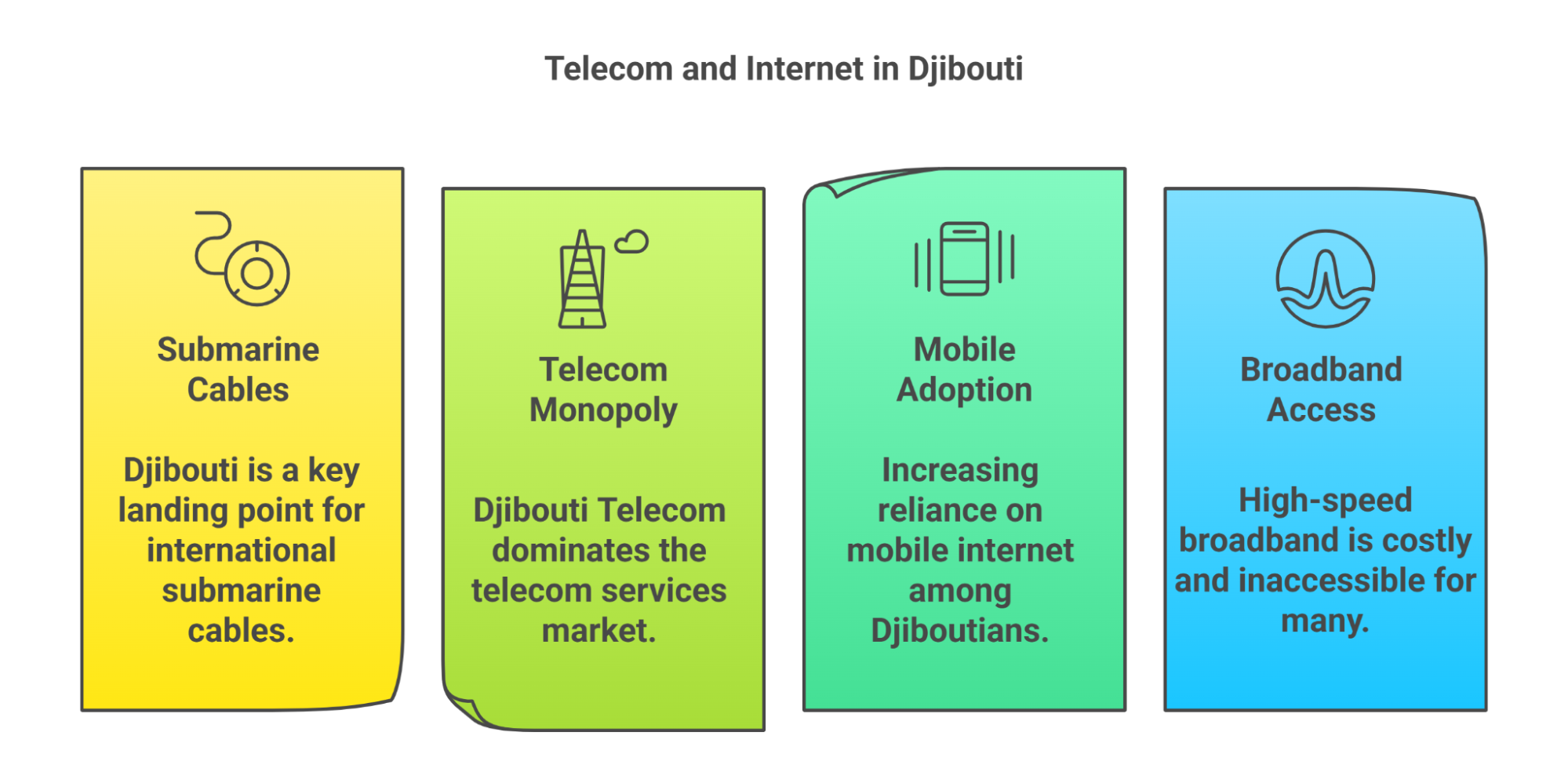
Djibouti plays a crucial role in Africa’s internet infrastructure, serving as a key hub for international data traffic. Its strategic location along the Red Sea has made it a landing point for multiple submarine cables, enabling high-speed internet access and improving regional connectivity. The country’s internet backbone supports not only Djibouti but also landlocked neighbors like Ethiopia and parts of East Africa.

Djibouti is a landing point for several major submarine cables, ensuring stable and fast internet access. These cables connect Africa to Europe, Asia, and the Middle East, making Djibouti a critical link in global internet infrastructure.
|
Cable System |
Function & Coverage |
|
SEACOM |
Connects Africa to Europe and Asia, providing high-speed bandwidth for businesses and telecom providers. |
|
EASSy (Eastern Africa Submarine System) |
Links East African countries to the international internet, enhancing regional internet speeds. |
|
DARE 1 (Djibouti Africa Regional Express 1) |
Strengthens connectivity between Djibouti, Kenya, and Somalia, improving local internet access. |
|
PEACE (Pakistan & East Africa Connecting Europe) |
Facilitates faster data transmission between Africa, the Middle East, and Asia, boosting economic and trade-related communications. |
The government and private telecom operators continue to invest in expanding internet capacity, ensuring reliable and competitive digital services.
Djibouti’s internet penetration rate is growing but remains low compared to regional neighbors. Internet access is mainly available in urban areas, while rural regions struggle with poor network coverage and high costs.
Mobile connectivity plays a crucial role in communication and digital access in Djibouti. While the country has a growing mobile market, it faces challenges such as high service costs, limited competition, and slow adoption of advanced technologies. Efforts are being made to expand network coverage and improve affordability, but progress remains gradual.
Djibouti's telecommunications sector is primarily dominated by Djibouti Telecom, the state-owned operator, which holds a monopoly over most services. However, in recent years, the government has taken steps to liberalize the market, allowing for increased competition. Below is an overview of the mobile network operators in Djibouti:
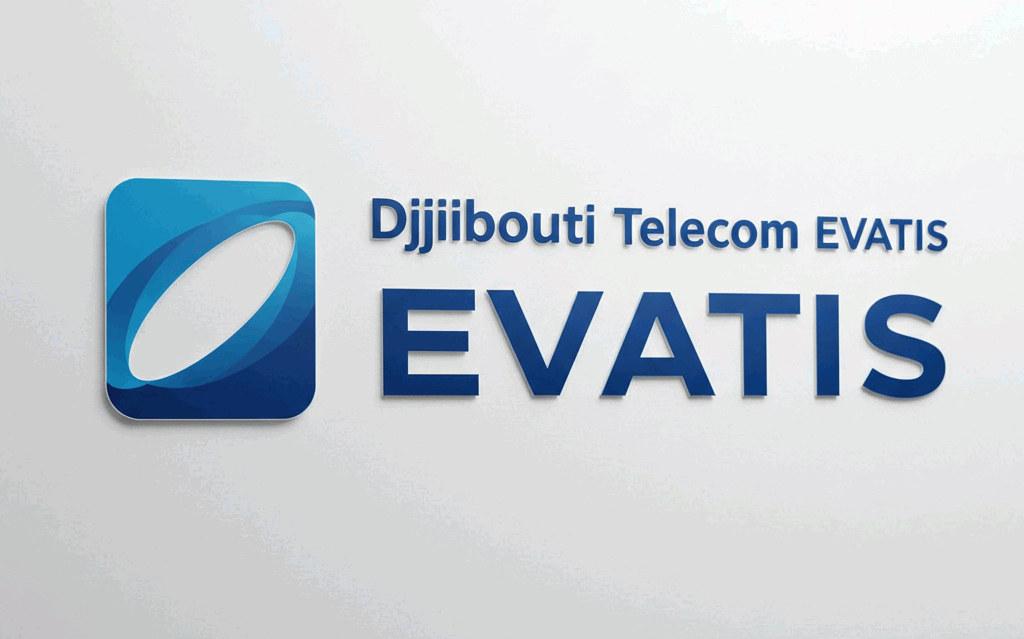
Djibouti Telecom, operating under the Evatis brand, is the leading telecommunications provider in Djibouti. It offers extensive nationwide coverage and provides mobile, internet, and fixed-line services. Evatis is known for its reliable network infrastructure and government backing, ensuring stability in its operations.
Evatis 4G and 5G Network in Djibouti
Djibouti Telecom offers a robust 4G LTE network, providing high-speed internet access across major cities and towns. The operator is in the early stages of exploring 5G deployment, with plans to enhance digital connectivity further. The expansion of its 4G and 5G services aims to support faster downloads, better streaming quality, and improved mobile experiences.
Services offered by Djibouti Telecom Include:
Market Share of Evatis in Djibouti: As the sole operator for many years, Djibouti Telecom holds a near-monopoly in the market, though this is gradually changing with market liberalization.
Djibouti Telecom Router Options for Tourists
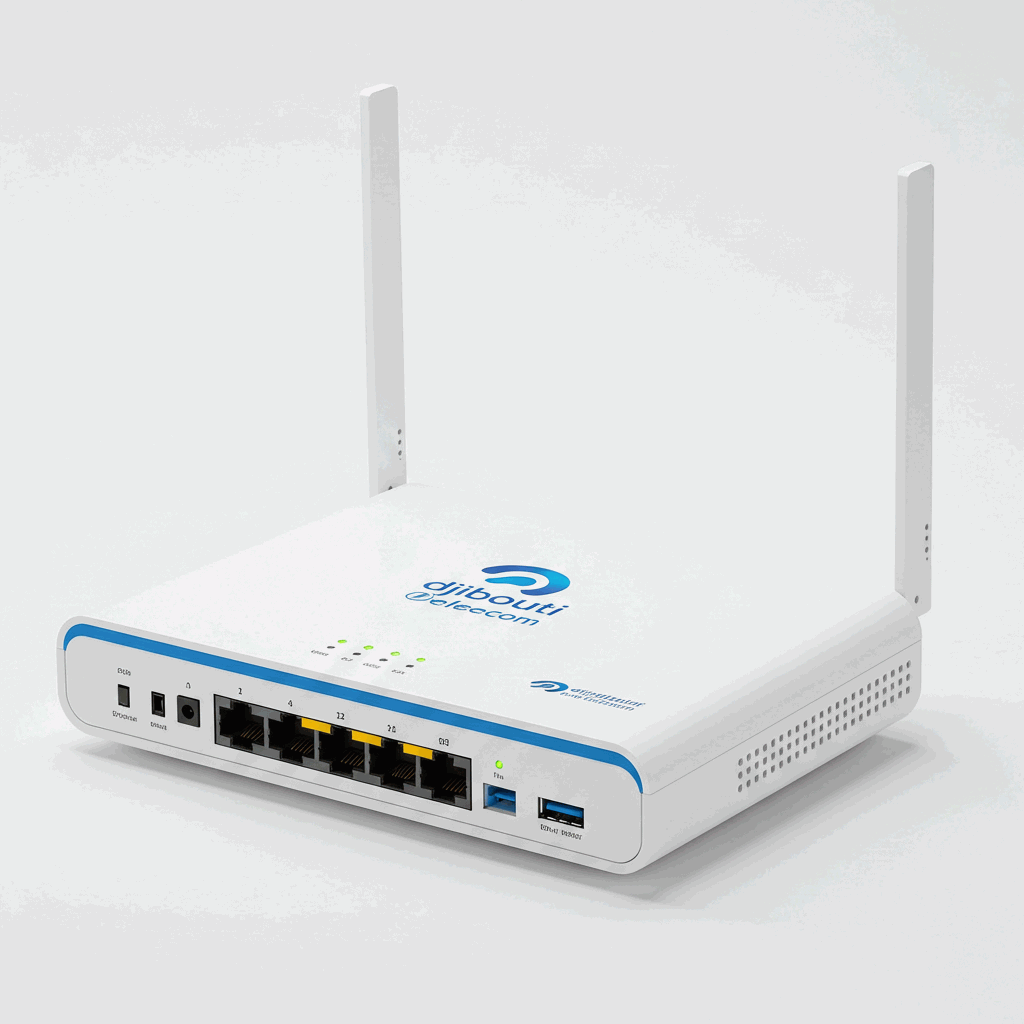
Djibouti Telecom, the sole mobile internet provider in Djibouti, does not explicitly advertise portable Wi-Fi router rentals tailored for tourists. However, they offer prepaid SIM cards under the Evatis brand, which can be a practical alternative for travelers seeking internet connectivity during their stay.
Evatis Prepaid SIM Cards: Purchase Locations: Available at Djibouti Telecom stores, notably in the Djibouti Bawadi Mall.
For tourists desiring portable Wi-Fi solutions, considering international portable Wi-Fi devices like Glocalme might be beneficial. These devices offer global coverage and can be purchased online, providing flexibility across multiple countries, including Djibouti.
|
Recommendation: Tourists visiting Djibouti can opt for the Evatis prepaid SIM card for affordable and reliable internet access. For those requiring a portable Wi-Fi router, investing in an international device like Glocalme could be advantageous, especially if traveling to multiple destinations. It's advisable to verify device compatibility with Djibouti's network frequencies to ensure optimal performance. |
Signal Strength Map
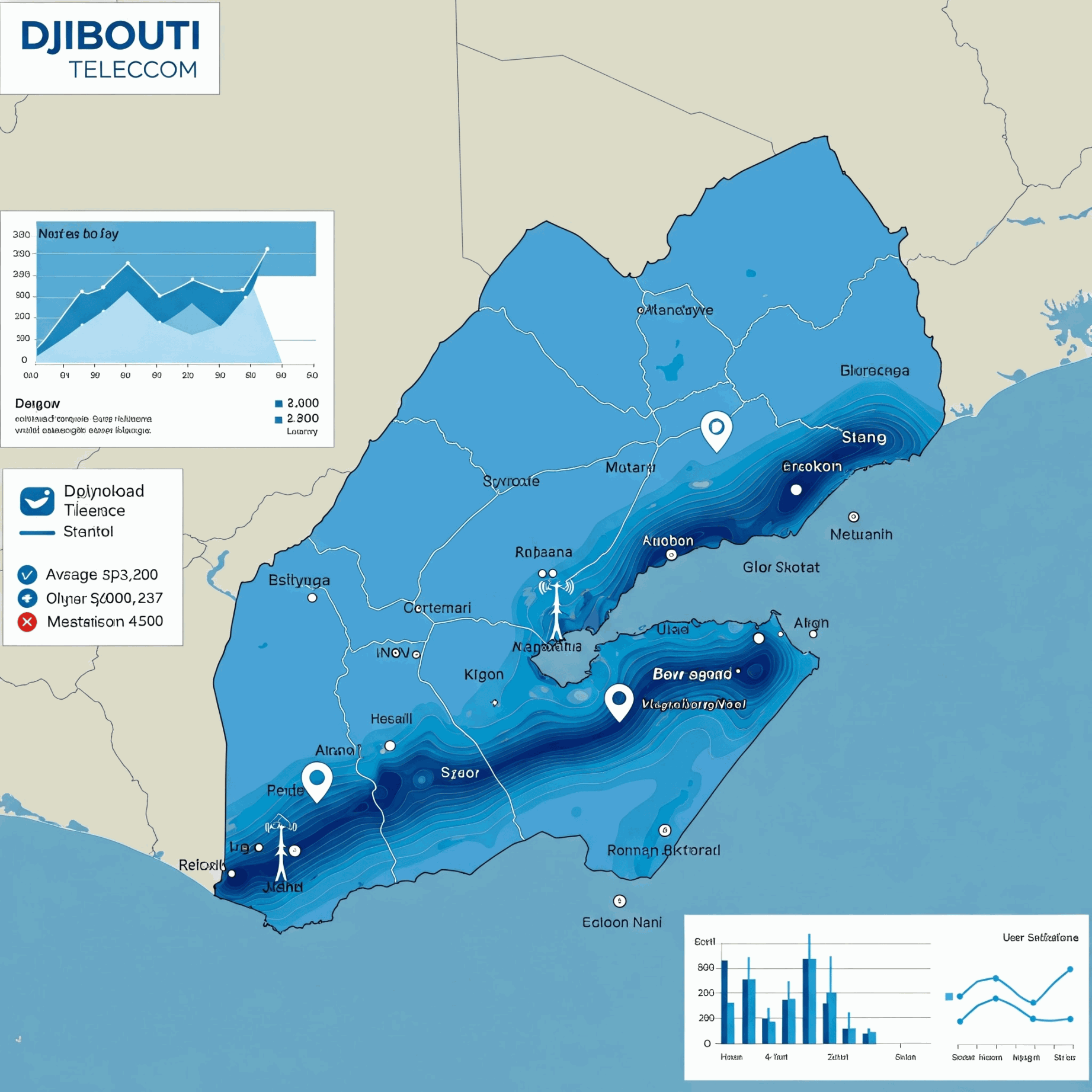
Djibouti Telecom's mobile brand, Evatis, offers coverage across Djibouti, utilizing the following frequency bands:
However, the overall coverage quality is considered mediocre, with certain regions experiencing limited or no service. Notably, areas like Tadjoura have documented signal strength data, which can be explored through interactive coverage maps.
Pricing and Packages of Djibouti Telecom Network
Evatis offers competitive mobile data and calling packages. Users can select prepaid or postpaid plans based on their requirements. Internet packages range from daily bundles for casual users to monthly unlimited plans for heavy users.
Here is a table summarizing the pricing and packages of Djibouti Telecom (Evatis):
|
Package Type |
Plan Name |
Data |
Calls |
SMS |
Validity |
Price (DJF) |
|
Daily & Short-Term Packages |
Express |
50 MB |
N/A |
N/A |
1 day |
100 DJF |
|
Avantage |
250 MB |
N/A |
N/A |
2 days |
300 DJF |
|
|
Confort |
1 GB |
N/A |
N/A |
3 days |
500 DJF |
|
|
Monthly Packages |
Classic |
20 MB |
30 min |
20 SMS, 10 MMS |
30 days |
500 DJF |
|
Business Premium |
100 MB |
120 min |
50 SMS, 20 MMS |
30 days |
2,000 DJF |
|
|
Business Gold |
500 MB |
180 min |
100 SMS, 50 MMS |
30 days |
5,000 DJF |
|
|
Postpaid Packages |
Bronze |
60 MB |
1,200 min |
N/A |
30 days |
20,000 DJF |
|
Platine |
200 MB |
70 min |
N/A |
30 days |
30,000 DJF |
|
|
Saphir |
120 GB |
3,300 min |
N/A |
30 days |
50,000 DJF |
|
|
Hybrid Packages (Forfait Tranquillité) |
Silver |
20 GB |
400 min |
Unlimited |
30 days |
7,000 DJF |
|
Gold |
40 GB |
520 min |
Unlimited |
30 days |
10,000 DJF |
|
|
GPRS (Data-Only) Packages |
Express |
1 GB |
N/A |
N/A |
24 hours |
200 DJF |
|
Découverte |
5 GB |
N/A |
N/A |
3 days |
500 DJF |
|
|
Évasion |
12 GB |
N/A |
N/A |
7 days |
1,000 DJF |
|
|
Confort |
20 GB |
N/A |
N/A |
30 days |
3,000 DJF |
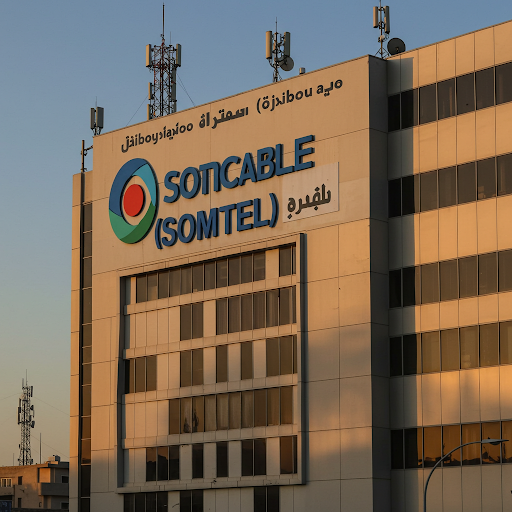
Somcable, operating under the SOMTEL brand, is another key player in Djibouti's telecommunications sector. Known for its competitive pricing and expanding network, SOMTEL focuses on providing high-speed internet and mobile services tailored to the local market. It is a private operator that has been granted a license to provide mobile and internet services, breaking Djibouti Telecom's monopoly.
Services offered by SOMTEL mobile operator include::
Coverage: Somcable is still expanding its network infrastructure, and its coverage is currently limited to urban areas, particularly Djibouti City. The entry of Somcable is expected to increase competition, improve service quality, and reduce prices for consumers.
Djibouti SOMTEL 4G and 5G Network
SOMTEL has invested in advanced telecommunications infrastructure in Djibouti, deploying 4G LTE for fast and reliable connectivity. The company is also testing 5G technology, which will enhance internet speeds, reduce latency, and support advanced applications like IoT and smart cities. SOMTEL offers various routers, including portable Wi-Fi hotspots and home broadband options, ensuring seamless connectivity for individuals and businesses.
Pricing and Packages for SOMTEL Network in Djibouti
SOMTEL provides affordable data and call bundles catering to different user needs. Customers can choose from daily, weekly, and monthly data packages, making it a flexible option for mobile internet access. Below is an overview of their offerings:
Unlimited Data Packages:
|
Package |
Data |
Validity |
Price |
|
Unlimited 24 Hrs |
Unlimited |
24 hours |
$0.52 |
|
Unlimited 48 Hrs |
Unlimited |
48 hours |
$1 |
|
Unlimited Weekly |
Unlimited |
7 days |
$5 |
|
Unlimited Monthly |
Unlimited |
30 days |
$20 |
Casri Data Packages:
|
Package |
Data |
Validity |
Price |
|
Uncapped Day |
600 MB |
1 day |
$0.12 |
|
Uncapped Day |
1.3 GB |
1 day |
$0.25 |
|
Uncapped Day |
2.4 GB |
1 day |
$0.5 |
|
Uncapped Day |
4.5 GB |
1 day |
$1 |
|
Uncapped Week |
500 MB |
7 days |
$0.12 |
|
Uncapped Week |
1 GB |
7 days |
$0.25 |
|
Uncapped Week |
2 GB |
7 days |
$0.5 |
|
Uncapped Week |
4 GB |
7 days |
$1 |
|
Uncapped Week |
8 GB |
7 days |
$2 |
|
Uncapped Month |
25 GB |
30 days |
$5 |
|
Uncapped Month |
50 GB |
30 days |
$10 |
|
Uncapped Month |
99 GB |
30 days |
$15 |
|
Uncapped Month |
122 GB |
30 days |
$20 |
Muraad Voice and SMS Packages:
|
Package |
Services |
Validity |
Price |
|
Muraad Day |
Voice + SMS |
1 day |
$0.25 |
|
Muraad Week |
Voice + SMS |
7 days |
$1.5 |
|
Muraad Month |
Voice + SMS |
30 days |
$3 |
VIP Bundles:
|
Package |
Data |
Validity |
Price |
|
VIP Bundle |
100 GB |
30 days |
$15 |
|
VIP Bundle |
125 GB |
30 days |
$20 |
|
VIP Bundle |
150 GB |
30 days |
$25 |
|
VIP Bundle |
170 GB |
30 days |
$30 |
|
VIP Bundle |
220 GB |
30 days |
$50 |
4G Home Router Packages:
|
Package |
Data |
Validity |
Price |
|
Home Router |
Unlimited |
30 days |
$25 |
|
Home Router |
Unlimited |
30 days |
$50 |
|
Home Router |
Unlimited |
30 days |
$75 |
While Djibouti Telecom and Somcable are the primary mobile network operators, the government has expressed interest in further liberalizing the telecommunications sector. This could lead to the entry of additional operators in the future, fostering greater competition and innovation.
With rising mobile usage, mobile banking and digital payment services have started gaining traction. Djibouti Telecom launched D-Money, a mobile payment platform, to facilitate digital transactions. However, the adoption rate remains low due to a lack of awareness and financial inclusion barriers.
Despite its role as a key internet gateway for Africa, Djibouti faces several challenges in providing affordable and widespread connectivity..
Djibouti recognizes the importance of digital connectivity for economic growth and regional influence. To address existing challenges and improve internet services, the government has launched several initiatives aimed at modernizing the telecom sector, expanding infrastructure, and attracting foreign investment. These efforts are expected to enhance internet affordability, accessibility, and overall digital development in the country.
To enhance internet and mobile connectivity, Djibouti should focus on:
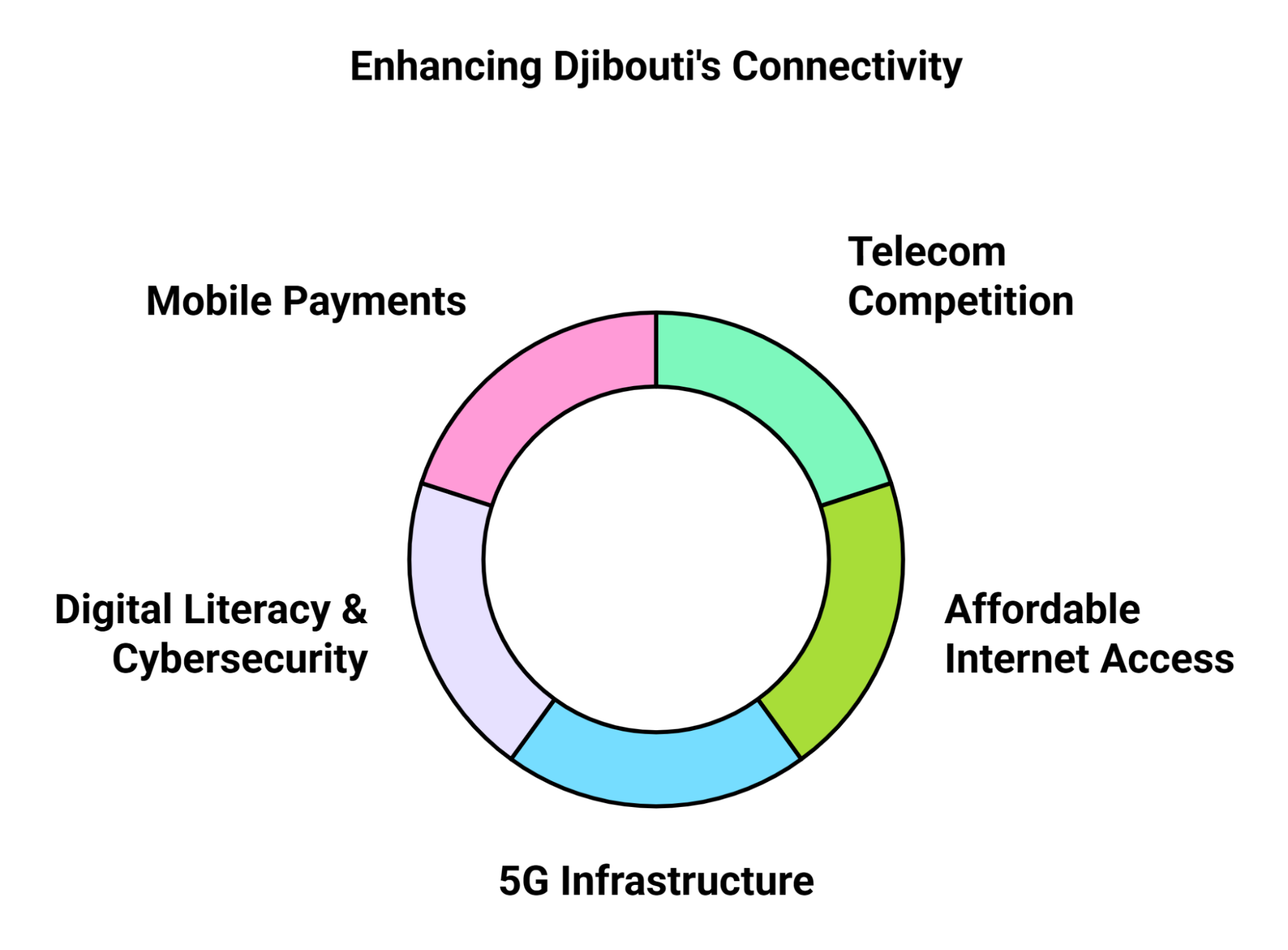
Djibouti is uniquely positioned as a global internet gateway, yet local connectivity challenges persist. While the country benefits from an extensive submarine cable network, high costs, a lack of competition, and limited infrastructure development continue to hinder widespread access.
To unlock the full potential of internet and mobile connectivity, Djibouti must open its telecom sector, invest in digital infrastructure, and make internet access more affordable. With strategic reforms and increased private sector involvement, the country can transform into a regional digital hub, fostering economic growth and digital innovation.
Content Disclaimer: While this information was last updated in January 2026, we strongly suggest confirming all travel details with the appropriate governmental agencies, embassies, and airlines.
Step1: Complete the online application form with your personal details and passport information.
Step2: Proceed to securely pay online using your credit card.
Step3: Check your email for payment confirmation and receipt of your Djibouti eVisa, which will be sent electronically.